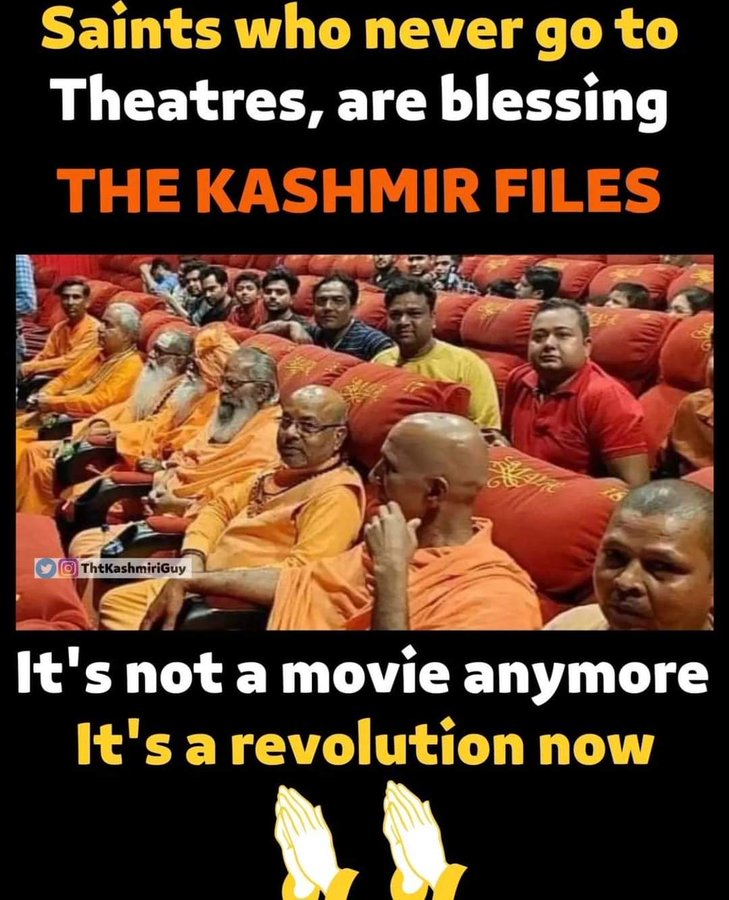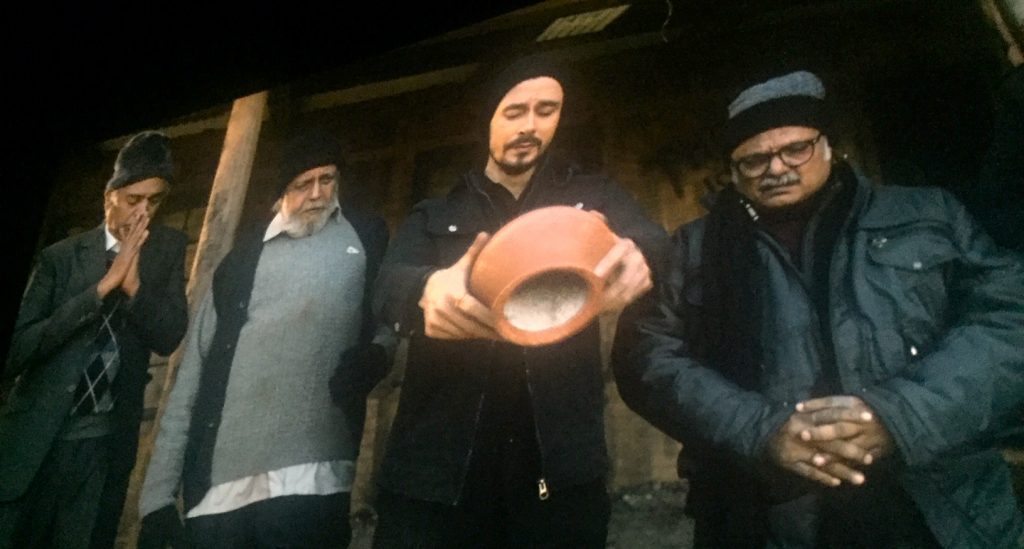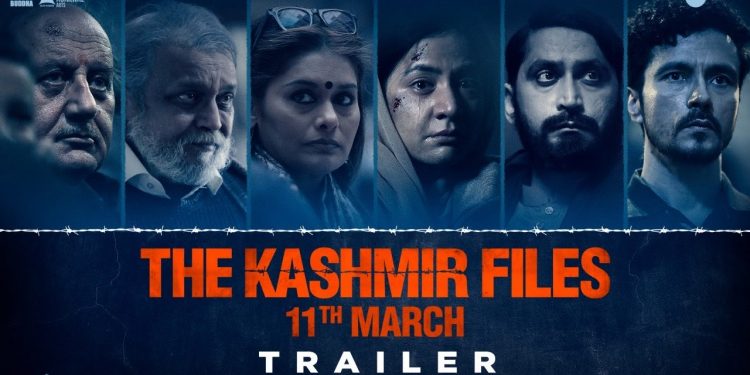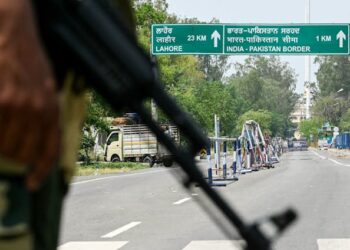The story of the exodus of Kashmiri Pandits from the valley in 1990 is promoted as a genocide of Hindus.
Release of Vivek Agnihotri’s film The Kashmir Files has caused a veritable storm among India’s non resident Indian (NRI) population across the globe. Claims of propaganda have cropped up along with assertions of “depiction of truth” by the other side – a clear line divides viewers into two distinctly separate groups.
As we know, unlike other art forms, films are capable of creating an illusion of reality which makes some of us believe movies to be accurate depictions of real life. This issue becomes even more pronounced when films depict unknown cultures, places or even times.
While serving as a source of entertainment, there is also a danger that movies could arouse social consciousness by distorting historical events making it both a persuasive but untrustworthy medium. Political forces, aware of cinema’s powerful reach, have naturally used this media form to mobilize and indoctrinate society with different views, sometimes in a good way and sometimes, not so good.

In his film, Agnihotri shows his young hero, Krishna, transform into a righteous, nationalist Hindu despite the machinations of a cunning and ‘liberal’ lady-professor. Coincidentally, in Germany of the 1930s, a film called Hitler Youth Quex, depicted a young man’s transformation from a communist sympathiser to an unquestioning follower of the Hitler Youth movement and the “new” Germany. In both films, the young man is transformed into a political property of the state.
Propaganda films were an important asset of the Nazi regime. Perhaps the most profound archetype was the 1940 production of Jud Suss, a brutal anti-Semitic film based on a story set in the 18th century. There were special screenings of the movie for concentration camp guards and SS commandos before they left for a mission. The story was billed as history that urged its audience to learn its lessons from the film in order to spare exploitation of future generations by the “treacherous” Jews, who lust after power, money and sex.
A good film based on a good storyline would demand attention irrespective of any grand marketing. Vivek Agnihotri’s film, however, is seeing huge endorsement right from the Prime Minister’s office and chief ministers urging people to watch the film to know the ‘truth’, down to nationalist keyboard warriors warning against a repeat of bloodshed in the event of Islamisation of the whole country.
Hindu organisations are promoting the film on social media in a big way. Theatres are being booked and people are requesting Hindus to watch the film. Unsurprisingly, only Hindus are being urged to watch. Gone are the days of Ramayana and Mahabharata on Sunday morning television, people are now being pushed to watch graphic violence and one-sided story-telling as a part of their religious duty.
Take the chilling words from the Union Cabinet Minister for Women & Child Development, Smriti Irani, who tweeted about the film: “Watch …so that this history soaked in the blood of innocents may never repeat itself.”
In an unprecedented move, even the Prime Minister of India, Mr. Narendra Modi has spoken up about the film and the “facts” that needs to be said.
Speaking at the BJP parliamentary party meeting in Delhi recently, he said: “The entire Jamaat (gang) that raised the flag of freedom of expression has been furious for 5-6 days. Instead of reviewing the film on the basis of facts and art, there’s a conspiracy to discredit it.” Endorsement of a movie, even defending its veracity, by the leader of a country, surely ranks high on the list of firsts for the Indian film industry.
It is not often that you hear the producer of a film gush about a country’s leader either. Abhishek Agarwal, producer of The Kashmir Files has thanked the prime minister profusely on social media and said: “It was a pleasure to meet our Hon’ble Prime Minister Shri Narendra Modi Ji. What makes it more special is his appreciation and noble words about The Kashmir Files. We’ve never been prouder to produce a film.”

Vivek Agnihotri, the director of the film, also got on Twitter to declare his extravagant appreciation of the leadership of India with the message: “I am so glad for you Abhishek Agarwal. You have shown the courage to produce the most challenging truth of Bharat. The Kashmir Files screenings in USA proved the changing mood of the world in the leadership of Narendra Modi.”
Chief ministers of states ruled by Bharatiya Janata Party (BJP) are making the movie tax-free in order to attract audiences from every class of society and some are even offering half-days off work for people to find time to watch it. It wouldn’t be wrong to say that this level of government publicity for a film has not been seen in India before.
Even before the film was released, Agnihotri had sent out a grim message on social media that read: “India is at war. But nobody is telling you. Not anymore. Pl (please) watch the trailer of the most Brutally Honest story of Kashmir Genocide.” It did not take long for people to understand who the villains of this “war” were.
Support for the cause has also been pouring in from cricketers, actors, erstwhile film directors and other celebrities. Chetan Bhagat, author, columnist and screenwriter wrote about the movie: “A film that came like an orphan. Much like the Kashmiri Pandits it depicts, nobody cared.”
Non-resident Indian communities are also ramping up their efforts to promote it in a big way. Nationalistic slogans like ‘Bharat Mata ki Jai’ are resounding in cinema halls in Australia where the film is being shown. A temple in Melbourne has also taken it upon itself to screen this violent film on its premises this coming Sunday.
The film seems to have had the desired effect on its audience. Moviegoers have watched the shockingly bloodthirsty scenes unfold on screen, depicted as “truth”, and have naturally been affected by it. Many have broken down in tears, unable to describe their feelings at the horror their fellow-Hindus have had to face in Kashmir. People are coming out of the cinema halls angry and thirsting for revenge.
Many are heard cursing the Congress party, the main opposition to BJP today, as being silent spectators and facilitators of the “genocide”.
So, what do the critics say about the film, that claims to have documented the atrocities committed on only the Hindus in the valley?
The New Indian Express has called the movie a limp attempt at provocation. In a scathing review about the claim that it champions the case of displaced Kashmiri Pandits in the film, it says, “the Kashmir Files hasn’t the slightest concern for its subject people, gleefully exploiting their trauma and tragedy for cheap rhetoric. And its communal agenda is so brazen, it beats most mainline propaganda.”
“We are shown killings, desecrations, and senseless acts of pillage and abuse. In evoking this bloodlust, the film gives away its own. The violence isn’t contextualized — graphic provocation is all it’s meant to achieve.”
The Print, in its review of the film said: “While (The Kashmir Files) brings out the truth and the much-needed story of Kashmiri Pandits, it tanks its credibility by mingling with facts, defaming JNU, blaming selective politicians, and ignoring the rest of the period of unrest in the late 1980s and early 1990s in Kashmir. It could have been a stunning tribute to the cause, but Agnihotri’s personal opinions give the film and its credibility a death blow.”

Regarding the portrayal of “adversaries” in the movie The Print says simply: “There is no softer way to put it – The Kashmir Files, through and though, is trying to defame JNU, portraying it as an anti-national, terror-friendly institute. Somehow, Vivek Agnihotri also manages to bring up Article 370 in order to connect it with the exodus. The movie almost blames it to be one of the reasons for the displacement of Kashmiri Pandits.”
The Hindu has said the makers of the movie have “employed some facts, some half-truths, and plenty of distortions, it propels an alternative view about the Kashmir issue, with the intent to not just provoke… but incite.”
The review further points a finger at Agnihotri’s inclination to look at the past through the prism of today and says, “the film underplays the Pakistan-Afghanistan angle and puts the onus for perpetuating the insurgency on the local Muslim. In Agnihotri’s documentation, terror has a religion, and it appears every Muslim in Kashmir has been a separatist and keen to convert Hindus to Islam. How the Dogra Kings ruled the State till 1947 is out of the syllabus here.”
Curiously, the movie also tries to pin the blame of the genocide on Farooq Abdullah and the Rajiv Gandhi-led government in Delhi. However, during the exodus, V.P. Singh was the prime minister, supported by the BJP, but the blame is pinned on Home Minister Mufti Mohammad Sayeed instead. And if that wasn’t enough, the director does not forget to depict a terrorist asking the young student, Krishna, to go against Narendra Modi as well.
Mehbooba Mufti, president of the Jammu and Kashmir Peoples Democratic Party (JKPDP) and former chief minister of J&K says, “the manner in which GOI is aggressively promoting Kashmir Files and is weaponising pain of Kashmiri Pandits makes their ill intention obvious. Instead of healing old wounds & creating a conducive atmosphere between the two communities, they are deliberately tearing them apart.”
Ms Mufti has herself experienced the horrors of insurgency first hand when her sister, Rubaiya Sayeed was kidnapped by Jammu Kashmir Liberation Front (JKLF) members on December 8, 1989, from Srinagar to ensure the release of their accomplices lodged in different jails.
In fact, her words have been echoed by the Kashmiri Pandit Sangarsh Samiti (KPSS) an organization which primarily addresses the concerns of resident Kashmiri Pandits and Hindus who stayed back in the Valley. In a post on social media, they have declared their dire situation thus:
“Kashmir files makes resident Kashmiri pandits unsafe.”
They have reiterated what many other Hindus who have experienced the exodus in the 90s are saying, that every Kashmiri Muslim is not a terrorist and every Kashmiri pandit is not communal. They both respect, love and share the pain which every Kashmiri has gone through in the last 32 years.
Sanjay Tickoo, the 54-year-old leader of KPSS, had earlier this year said there was lack of will both on the part of the Union Territory (UT) administration as well as the Central government to bring back migrant Kashmiri Pandits to the Valley.
“Neither the Lieutenant Governor’s administration nor the Ministry of Home Affairs (MHA) or the Prime Minister’s Office show seriousness to bring back migrant Kashmiri Pandits. They lack the will,” Mr. Tickoo told The Hindu in January this year.
On August 14, 2019, India Today carried a story of Shadi Lal Pandita, a Kashmiri Pandit, who while speaking to IANS, had said the abrogation of Article 370 was the tipping point as it could further escalate communal tension in the state. Pandita was forced to migrate along with his family to Jammu in 1989 when the terror attacks started.
Pandita and many others who fled Kashmir in the wake of cross-border terrorism decades ago, feel that abrogation of Article 370 was done in haste, without taking violence-hit people into confidence.
They feel the actual work of the National Democratic Alliance (NDA) government in J&K should have been to ensure safe return of around 80,000 Kashmiri Pandit families settled mostly in Jammu and Delhi. Instead, they feel the battle of winning hearts and minds has been discarded through thoughtless authoritarian acts. In fact, 60-year-old Pandita said he doubts if the Centre has any rehabilitation policy.
There are many who are openly declaring their intention to give the Kashmir Files a miss.
Kedar Gadgil writes in his blog: “I have not seen The Kashmir Files. I do not know if I will have the bandwidth or interest to see it (even if it has a brilliant actor like Anupam Kher in it). Because even without seeing it, simply knowing that it was made with a single point agenda of changing the known and accepted historical narrative to something that is tailored to fit the hate and bigotry-tinted lenses vision of the director, whose sympathies are quite well-known because of his own admission, is enough for me to know that it will not be worth my time or money, even if all those propagandists are telling me to see it.”
There are many more who are voicing their concerns about the veracity of the claims made by the writers of the film.
The exact impact of indoctrinated representation on public imagination can never be fully gauged but there is no doubt that movies play an important role in sustaining regimes and strengthening ideas that they support.
It is vital that moviegoers apply a critical eye when viewing films. As a tool of propaganda, cinema has often been used with the goal of division in mind, but by remaining an impartial and rational viewer, the audience are the ones who can prevent this untoward outcome.











